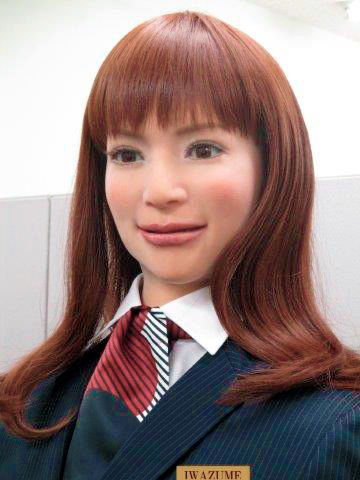Japan soon to boast robot-run hotel, not necessarily bad thing

Ten robots will greet guests in four different languages (English, Japanese, Chinese and Korean), carry luggage and take care of cleaning the rooms.
Transparent glasses that allow people to browse the internet and play a game of Candy Crush simultaneously? Yes, they exist.
Trains that run faster than 250 miles per hour and use magnetic levitation? Yes, they exist too.
Some may wonder: ‘What’s next?’ Perhaps a hotel run mostly by humanoid robots? This will soon exist too.
This July, Henn-na Hotel, located in Nagasaki, Japan, will open for business. There will be 72 rooms available, starting at $60 per night. Ten robots will greet guests in four different languages (English, Japanese, Chinese and Korean), carry luggage and take care of cleaning the rooms.
The robots will also have the capability of mimicking human behavior such as breathing and blinking.
However, one of the most impressive talents of these robots will be their ability to make eye contact and respond to guests body language, reports Sarah Kaplan, writer for The Washington Post.
The news may leave many people awestruck, while others will be left murmuring darkly to themselves. They will talk about how this is the end of humankind and it is just about time for robots to rule over the world and destroy us all.
As a lover of technology and anything that makes my life easier, I cannot stress my disagreement enough.The world has modernized very quickly over the last century and I doubt it will stop anytime soon.
To be wary of new technology will only make life harder on oneself, as I doubt one would be able to keep up with those that embrace new gadgets.
Whoever rejects modernization of labor and tools may bring up the argument that due to the humanoid robots, many labor workers will lose their jobs due to the greater efficiency robots will have. On the other hand, people such as myself would argue that the lack of labor jobs would mean an increase of people seeking out other jobs.
There are many fields that lack workers and would benefit greatly from an increase of job hunters.
Such fields include medicine, engineering and information science. Although these careers would require people to obtain advanced educational degrees, it is also very probable that the influx of college students would make college institutions more selective; therefore, education quality would increase.
Again, an argument could be made against this. What if a person – even with an outstanding academic report – cannot afford to go to a higher learning institution to study?
Certain occupations, including the ones named above, constantly seek new people who will join them. Not only that, they offer massive amounts of money in scholarships and grants for minority or economically disadvantaged groups to join them.
According to Crosby Burns, Kimberly Barton, and Sophia Kerby from The Center for American Progress, one-third of labor force workers are made up of minorities. That is more than 51 million workers that could apply for specialized financial aid.
Even through all this, there is no doubt many will still be distrustful of the idea of robots carrying luggage up to their hotel room. Nevertheless, this type of person has existed for ages and they will continue to be present –denying themselves the commodity and opportunities modern technology offers.
While it may seem like too much at this point, there will come a time in which humanoid robots will become as common as computers and will no longer faze us.






